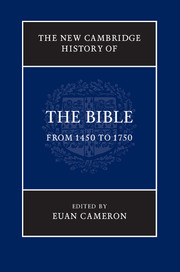Book contents
- Frontmatter
- Contents
- List of figures
- List of contributors
- Preface
- List of abbreviations
- Introduction
- PART I RETRIEVING AND EDITING THE TEXT IN EARLY MODERN EUROPE
- PART II PRODUCING AND DISSEMINATING THE BIBLE IN TRANSLATION
- PART III PROCESSING THE BIBLE: COMMENTARY, CATECHESIS, LITURGY
- PART IV THE BIBLE IN THE BROADER CULTURE
- 25 The Bible in political thought and political debates, c. 1500–1750
- 26 The problem of ‘spiritual discipline’: Apocryphal books among sixteenth-century leaders of the Lutheran churches
- 27 The Bible and the emerging ‘scientific’ world-view
- 28 Between humanism and Enlightenment: Morality, reason and history as factors in biblical interpretation
- 29 The Bible and the early modern sense of history
- 30 The Bible and literature in the European Renaissance
- 31 The Bible and the visual arts in early modern Europe
- 32 The Bible and music in the early modern period (1450–1750)
- PART V BEYOND EUROPE
- Afterword
- Select bibliography
- Select Bible bibliography
- Index
30 - The Bible and literature in the European Renaissance
from PART IV - THE BIBLE IN THE BROADER CULTURE
Published online by Cambridge University Press: 05 August 2016
- Frontmatter
- Contents
- List of figures
- List of contributors
- Preface
- List of abbreviations
- Introduction
- PART I RETRIEVING AND EDITING THE TEXT IN EARLY MODERN EUROPE
- PART II PRODUCING AND DISSEMINATING THE BIBLE IN TRANSLATION
- PART III PROCESSING THE BIBLE: COMMENTARY, CATECHESIS, LITURGY
- PART IV THE BIBLE IN THE BROADER CULTURE
- 25 The Bible in political thought and political debates, c. 1500–1750
- 26 The problem of ‘spiritual discipline’: Apocryphal books among sixteenth-century leaders of the Lutheran churches
- 27 The Bible and the emerging ‘scientific’ world-view
- 28 Between humanism and Enlightenment: Morality, reason and history as factors in biblical interpretation
- 29 The Bible and the early modern sense of history
- 30 The Bible and literature in the European Renaissance
- 31 The Bible and the visual arts in early modern Europe
- 32 The Bible and music in the early modern period (1450–1750)
- PART V BEYOND EUROPE
- Afterword
- Select bibliography
- Select Bible bibliography
- Index
Summary
Erasmus's colloquy Convivium religiosum, composed and published in 1522, gathers together a group of intimate friends for an exquisite lunch in the countryside in midsummer. The scene is a classical locus amoenus; the house is ‘elegant’ but not ‘luxurious’. The garden itself provides all their needs. The wine is du terroir; melons, figs, pears, apples and nuts drop into their laps. We could be in Horace's Sabine farm or Cicero's villa at Tusculum. Erasmus quotes Horace's Epodes, just in case we miss the reference. This is one of half a dozen of the Colloquia which conform to the Classical genre of a Platonic symposium, a feast at which friends share stories and philosophise. ‘The whole Renaissance’, Johan Huizinga reminds us, cherished the wisdom and conversation of friends ‘in the cool shade of a house under trees’. The topic of the convivium, however, is not love or hospitality or folly, but how to read the Bible. The participants all have Greek names suggesting piety or learning (Eusebius, Timothy, Theophilus). A serving boy comes in to say that the meal is spoiling with all their talk; Eusebius, the host, tells him to stay calm. Eusebius says grace via a homily of Chrysostom. But, he continues, there is still no place set for Christ to join in with their feast. He gets the boy to read from the Bible, a passage from Proverbs. Dinner has to wait until Eusebius, followed by three of his companions, offers an exegesis of the verse. Except that, while we are listening to their commentary, it becomes obvious that the feast has already begun, and they do not want for any delicacy, savoury or sweet.
The interpretation of Scripture provides the allegorical narrative as well as the formal subject of Erasmus's fable. None of the companions is a priest or a professional theologian, Erasmus stresses: they are laymen and married; they quote from the ancient Fathers but never from scholastic doctors. The dialogue thus taps into the controversies then raging at the onset of the Reformation about the role of the laity, vernacular translation, and the place of Scripture in everyday devotion.
- Type
- Chapter
- Information
- The New Cambridge History of the Bible , pp. 686 - 717Publisher: Cambridge University PressPrint publication year: 2016



